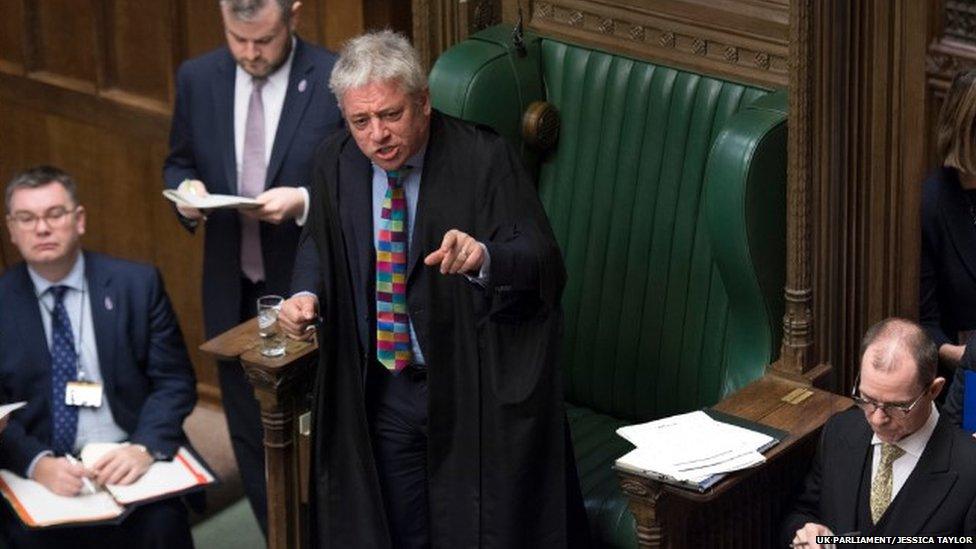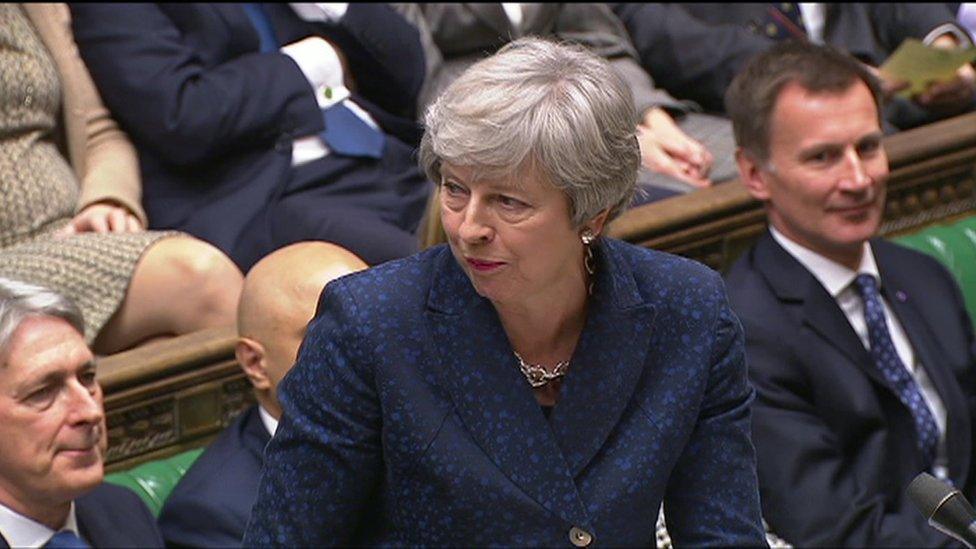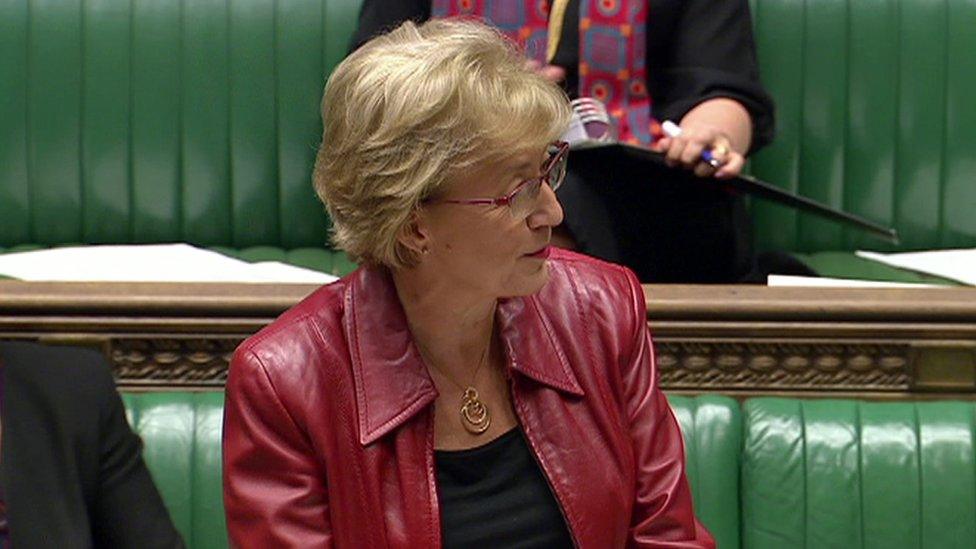Week ahead in Parliament
- Published
- comments

It's raining amendments in Westminster, as rival groups of MPs road-test different approaches to various Brexit issues, in the run-up to Tuesday's big debate.
As I write, 14 amendments adorn the order paper, and it is highly likely that more will be spawned as the various factions plot over the weekend.
Some will seek a solution to the Northern Ireland backstop issue, to allow hard Brexiteers and the DUP to rally behind the government's Brexit deal; some seek to give MPs more control over Brexit policy with a variety of ingenious procedural devices.
Some flat-out recommend a postponement of Brexit Day from 29 March, either to allow more time for a deal to be found, or for a new referendum to be held.
Some of these amendments may evaporate before Tuesday, perhaps to be replaced by a new version designed to garner more support. Others may attract a critical mass of signatures from MPs - and Mr Speaker will announce which are to be debated on the day.
The selection will normally include the main opposition party's official amendment, and usually the SNP's as well.
After that the selection will take into account the breadth of support (both in numbers and across parties) of the different offerings, and the different options they offer. Expect much wailing and rending of garments from those not chosen.
Brexit continues to eclipse everything else in Parliament, but there are important matters being discussed under the radar - crises in Zimbabwe and Venezuela, solutions to youth violence in Britain, and support for new fathers....
Here's my rundown of the coming week:
Monday 28 January
The day starts with Housing, Communities and Local Government questions, with the usual crop of post-weekend urgent questions and ministerial statements to follow.
The main legislative action is the return of the Immigration and Social Security Co-ordination (EU Withdrawal) Bill - its second reading debate was postponed to make way for a motion of no confidence in the government.

Like a lot of other Brexit bills, it gives ministers a series of powers to implement a policy that has yet to be finalised. But it is intended to deliver a system focused on meeting the UK's skills need and will include a minimum salary requirement that immigrants will have to earn - although it will also have exceptions for skills which are in short supply, and will also include a system to allow in seasonal workers, which is important for agriculture and the hospitality sector.
Watch out for Harriet Harman, the chair of Parliament's Human Rights Committee, who will be pressing for an end to indefinite immigration detention - an issue the committee has been examining. She has the backing of a cross-party campaign including senior Conservatives like Andrew Mitchell and David Davis.
Then there will be a vote on introducing proxy voting in the Commons, allowing MPs on parental leave to nominate another MP to vote on their behalf.
The Leader of the House, Andrea Leadsom has said that if the changes are approved a year-long trial period will begin.
The change follows repeated complaints from female MPs over the current system, after a Conservative MP voted while being "paired" with the Liberal Democrat, Jo Swinson, who was on maternity leave. The Labour MP, Tulip Siddiq, was wheeled into last week's Brexit vote, having postponed a caesarean section after refusing a "pair". The Speaker, John Bercow, assured MPs that if the change was approved he intended proxy voting to be introduced with immediate effect.
The adjournment debate is on the relationship between school exclusions and youth violence, led by the Labour MP Vicky Foxcroft, who has seen 10 young people from her Deptford constituency killed since she was elected, in 2015. She has chaired a cross-party Youth Violence Commission (its report is published here, external) and she is systematically holding debates on some of the issues it raises. In particular, she wants to talk about the strong link between pupils being excluded from school and their becoming involved in violence, and she wants to examine the way money is spend on pupil referral units.
In Westminster Hall, the Petitions Committee has scheduled a debate e-petition 225767, external on lowering the age for smear tests for cervical cancer from 25 to 18.
The petition attracted 129,574 signatures and was started by Natasha Sale from Devon, who died in December, and who had metastatic cervical cancer. She argued that reducing the age of smear tests and cervical screening lives can be saved because there will be a greater opportunity to tackle cell changes early and prevent cervical cancer.
In the Lords (2.30pm), questions to ministers include one on the findings of Ofcom's investigations into the RT news channel.
The main event is another debate on Brexit - with another Labour frontbench amendment expected to be put to the vote. This calls on the government to "take all appropriate steps to ensure that (1) the United Kingdom does not leave the EU without an agreement with the EU, and (2) sufficient time is provided for this House to ensure the timely passage of legislation necessary to implement any deal or proposition that has commanded the support of the majority of the House of Commons."
Meanwhile, the Offensive Weapons Bill begins its committee stage in the Moses Room - the key issue will be shop-worker protection.
Tuesday 29 January
Another big Brexit day in the Commons opens (11.30 am) with Treasury questions - expect a few attempts to goad the Chancellor Philip Hammond into highlighting the government's internal divisions. Then comes a brief interlude considering the Labour MP Tracy Brabin's Ten Minute Rule Bill to ban smoking on NHS premises - this is aimed at pushing the government and Health England to increase the power of hospitals to ban smoking, something already in place in Wales and Scotland.
Confused by Brexit jargon? Reality Check unpacks the basics.
The main event is, of course, the Brexit debate. Will efforts to find a way to reunite Conservatives and the DUP behind the prime minister's deal succeed? Will MPs back one of the several mechanisms on offer to ensure the Commons has more traction over Brexit?
Or might a series of ministers, perhaps even Cabinet ministers, break ranks and risk being sacked, to back amendments which rule out a no-deal exit from the EU? Or will the most familiar sound of the Brexit debate, the hollow thud of a can being kicked yet further down the road, resound once more? Voting begins at 7pm - and might go on for quite some time.
The day's final event is the adjournment debate led by the Liberal Democrat Layla Moran, who will be pushing the government to back her bill to repeal the 1824 Vagrancy Act - the act is used to arrest and fine rough sleepers despite other more sophisticated legislation being available. She claims support from the charities Crisis, St Mungos and Centrepoint as well as from Jeremy Corbyn.
In Westminster Hall, subjects for debate include support for children with life-limiting and life-threatening conditions and their families, led by the DUP's Jim Shannon (9.30 am); short prison sentences, with the Labour MP Chris Evans (11.30am), exploring the Prisons Minister Rory Stewart's stated ambition to phase out short prison terms, on the grounds that they don't do any good, and replace them with community rehabilitation. Mr Evans will highlight that Wales has the highest proportion of its population imprisoned of any part of the UK.
The afternoon's debates include the Lib Dem Leader Sir Vince Cable on special educational needs and disabilities funding (2.30pm); the Conservative Alberto Costa on the regulation of non-surgical cosmetic procedures (a subject he has raised at PMQs) and the injuries that can result (4pm) and, very topically, Labour's Graham Jones on the political situation in Venezuela (4.30 pm).
My committee pick is the Health and Social Care Committee's session (2.30pm) on the Budget and the NHS long-term plan, with Health Secretary Matt Hancock and Simon Stevens of NHS England.
In the Lords (2.30pm) Labour peer and former Europe Minister Baroness Quin opens the day with an intriguing-looking question about discussions with ministers and the heads of police forces about security issues relating to Brexit.
Then comes report stage consideration of the Financial Services (Implementation of Legislation) Bill - this is a Brexit bill, which aims to transpose thousands of pages of EU regulation into UK law - but gives ministers sweeping powers to reshape it in the process.
At committee the bill ran into strong criticism from peers and the government has now presented its own amendments to meet those criticisms. There was particular alarm at the plans for dealing with so-called "in flight files" - EU regulations and directives which had not been fully implemented, where peers took particular exception to the powers ministers would have to, in effect, write new laws.
This looks like a fairly classic example of the way Lords opposition can push a government into substantial concessions, without a vote cast in anger.
Wednesday 30 January

The Commons opens (11.30 am) with Northern Ireland questions, with Prime Minister's Questions following at noon.
The day's Ten Minute Rule Bill could be something or nothing. Conservative second referendum backer Dr Sarah Wollaston has a measure called the European Union (Requirements Relating to Withdrawal) Bill, which is being kept as a sort of legislative back-up plan, in case her Commons allies fail to make any of their proposals stick in the previous day's debate. It might just provide a handy vehicle for them to keep some legislative scheme alive.
Then MPs turn to the second reading debate on the Crime (Overseas Production Orders) Bill - a measure to allow law enforcement agencies to apply to a UK court for an 'overseas production order' to gain access to electronic data held abroad, for the purposes of investigating and prosecuting serious crime.
In Westminster Hall the first debate (9.30am) is on supporting fathers in early parenthood - former minister Tracey Crouch will argue that family networks have become more fluid, but that approaches to supporting them have not kept pace. So, as the NHS looks to re-configure maternity services for the next decade she wants to discuss the role of fathers in the perinatal period and early parenthood.
She quotes new polling of UK fathers by Survation which found almost seven out of 10 new fathers said they thought "fathers were made to feel like a 'spare part' during the pregnancy period". Only a third of fathers reported any healthcare professional talking to them about their role as a father with a similar, if only slightly better story when it comes to Health Visitors or Children's Centres.
Other subjects for debate include Labour's Kate Hoey on the situation in Zimbabwe (2.30pm); the Conservative Philip Hollobone on illegal seaborne immigration across the Channel (4pm) and the Conservative John Lamont on World Cancer Day (4.30pm). He wants to highlight the work of cancer charities and health professionals do in the UK, but also to look at some of the reasons why cancer survival rates in the UK lag behind many European countries. And even though health is largely a devolved issue, he wants to consider how the whole of the UK can raise its game in terms of research, drug purchasing and learning from best practice.
My committee picks are the European Scrutiny Committee session on Brexit, with former minister Steve Baker (2.30pm) and the Public Accounts session on the BBC and personal service companies - which is about the tax handling of freelancers, with Lord Hall, the Director General, and Anne Bulford, Deputy Director-General (2.30pm).
In the Lords (3pm) the main event is the third day in committee on the Trade Bill - where the key issues are trade scrutiny procedures, agriculture and Northern Ireland. The dinner break mini debate is on access to NHS treatments for children and young people with mental health problems.
Thursday 31 January

The Commons day begins (9.30am) with 40 minutes of Digital, Culture, Media and Sport questions, then come questions to the Attorney General, and then the weekly Commons Business Statement from the Leader of the House, Andrea Leadsom.
The rest of the day is devoted to two Backbench Business debates - first on settling the debt owed to victims of the Equitable Life scandal, led by the Conservative, Bob Blackman. The motion calls on the government to make a commitment to provide full compensation to victims of the scandal.
The second debate is on the sustainability of maintained nursery schools, led by Labour MP Lucy Powell, on a motion calling on the government to safeguard the future of "these vital early years institutions by guaranteeing transitional funding after 2020 as soon as possible".
In the Lords (2.30pm) questions include Labour's Lord Grocott asking about a review of the powers of the Lord Speaker - a post deliberately designed to be much less powerful than the Speaker of the Commons. He wants to give the Lord Speaker control during question time and when statements are made. His aim is to bring a bit of order to what (in the context of the Lords, at any rate) is fractious conduct - but peers are wary of having an over-powerful Speaker, so any step towards it is seen as dangerously revolutionary by many of them.
The rest of the day is taken up by debates led by Labour peers - the first, led by Lord Whitty, is on long-term commitment to increased provision of social housing to help reduce housing costs; the second is from Lord Hunt of King's Heath, is on the NHS Long Term Plan. The lunch-time mini-debate is on the current situation in Zimbabwe.
Friday 1 February
The Commons is not sitting, but peers will debate the detail of two private members' bills from the Commons - the Organ Donation (Deemed Consent) Bill and of the Civil Partnerships, Marriages and Death (Registration etc) Bill.
The Lords opens for business at 10am.
- Published30 July 2019


